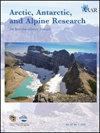Introduction: Processes and Palaeo-Environmental Changes in the Arctic from Past to Present (PalaeoArc) special issue
IF 2
4区 地球科学
Q4 ENVIRONMENTAL SCIENCES
引用次数: 0
Abstract
PalaeoArc (Processes and Palaeo-Environmental Changes in the Arctic: From Past to Present) is an international network research programme, the aim of which is to understand and explain the climatically induced environmental changes in the Arctic that have taken place throughout the Quaternary and continue in the present-day (see http://www.palaeoarc.no/). This network builds on and extends the impressive legacy of previous palaeo-Arctic network programs and projects extending back to the 1980s. This began with the “Polar North Atlantic Margins—Late Cenozoic Evolution” project (PONAM: 1990–1994; Hjort and Persson 1994; Landvik and Salvigsen 1995; Elverhøi et al. 1998), which was followed by the “Quaternary Environment of the Eurasian North” project (QUEEN: 1996–2002; e.g., Larsen, Funder, and Thiede 1999; Thiede et al. 2001, 2004; Kjær et al. 2006). These were then followed by the “Arctic Palaeoclimate and Its Extremes” project (APEX: 2004–2012; Jakobsson et al. 2008, 2010, 2014) and the “Palaeo-Arctic Spatial and Temporal Gateways” project (PAST Gateways: 2012–2018; Ó Cofaigh et al. 2016, 2018). The latest incarnation of the network—PalaeoArc— was conceived at the final meeting of the PAST Gateways project in Durham, UK, in April 2019, when a new international steering committee was appointed to organize a series of activities and annual conferences for the following six years (2019–2024). The new international network held its first meeting in Poznań (20– 24 May 2019), hosted by the Faculty of Geographical and Geological Sciences, Adam Mickiewicz University, Poznań (see Lyså et al. 2019), comprising the usual mix of talks, posters, discussions, workshops, and a field excursion. The network planned to organize a conference hosted by the Department of Earth Sciences at the University of Pisa in May 2020, but this had to be postponed due to the COVID-19 pandemic and was eventually held online in May 2021, endorsed by the International Arctic Science Council, Italian Geological Society, and Italian Association for the Study of the Quaternary. The meeting proved incredibly popular and was “attended” by over 250 Arctic scientists from twenty-six different countries over a four-day period, allowing glacial and marine geologists, palaeoceanographers, palaeoecologists, and specialists in permafrost and numerical modeling to discuss records of Arctic environmental change over decadal to millennial timescales. The collection of articles in this special issue stems from this second PalaeoArc International Conference and encompasses the diverse range of topics presented at the meeting, each of which addresses the overarching aims of PalaeoArc (detailed below). The third international PalaeoArc conference took place (in person) in Rovaniemi in August 2022. The network has been extended for a year, with further meetings planned in Akureyri (2023), Stockholm (2024), and Tromsø (2025).简介:从过去到现在北极的过程和古环境变化(古弧)特刊
PalaeoArc(北极的过程和古环境变化:从过去到现在)是一个国际网络研究计划,其目的是了解和解释气候引起的北极环境变化,这些变化发生在整个第四纪,并持续到今天(见http://www.palaeoarc.no/)。该网络建立并扩展了20世纪80年代以前的古北极网络计划和项目的令人印象深刻的遗产。这始于“极地北大西洋边缘——新生代晚期进化”项目(PONAM:1990–1994;Hjort和Persson 1994;Landvik和Salvigsen 1995;Elverhøi等人1998),随后是“欧亚北部第四纪环境”项目(QUEEN:1996–2002;例如Larsen、Funder和Thiede 1999;Thiede等人2001、2004;Kjær等人2006)。随后是“北极古气候及其极端”项目(APEX:2004–2012;Jakobsson等人2008、2010、2014)和“古北极时空门户”项目(PAST门户:2012–2018;ÖCofaigh等人2016、2018)。2019年4月,在英国达勒姆举行的PAST网关项目的最后一次会议上,该网络的最新化身PalaeoArc被构想出来,当时任命了一个新的国际指导委员会,负责在接下来的六年(2019-2024年)组织一系列活动和年会。新的国际网络在波兹南举行了第一次会议(2019年5月20日至24日),由波兹南Adam Mickiewicz大学地理和地质科学学院主办(见Lyså等人,2019),包括通常的会谈、海报、讨论、研讨会和实地考察。该网络计划于2020年5月组织一次由比萨大学地球科学系主办的会议,但由于新冠肺炎大流行,会议不得不推迟,最终于2021年5月在线举行,得到了国际北极科学理事会、意大利地质学会和意大利第四纪研究协会的认可。事实证明,这次会议非常受欢迎,来自26个不同国家的250多名北极科学家在为期四天的时间里“出席”了会议,使冰川和海洋地质学家、古海洋学家、古生态学家以及永久冻土和数值建模专家能够讨论十年到千禧年北极环境变化的记录。本期特刊的文章集源于第二届古弧国际会议,涵盖了会议上提出的各种主题,每一个主题都涉及古弧的总体目标(详见下文)。第三届国际古弧会议于2022年8月在罗瓦涅米(亲自)举行。该网络已延长一年,计划在阿库雷里(2023年)、斯德哥尔摩(2024年)和特罗姆瑟(2025年)举行进一步会议。
本文章由计算机程序翻译,如有差异,请以英文原文为准。
求助全文
约1分钟内获得全文
求助全文
来源期刊
CiteScore
3.00
自引率
5.00%
发文量
37
审稿时长
7 months
期刊介绍:
The mission of Arctic, Antarctic, and Alpine Research (AAAR) is to advance understanding of cold region environments by publishing original scientific research from past, present and future high-latitude and mountain regions. Rapid environmental change occurring in cold regions today highlights the global importance of this research. AAAR publishes peer-reviewed interdisciplinary papers including original research papers, short communications and review articles. Many of these papers synthesize a variety of disciplines including ecology, climatology, geomorphology, glaciology, hydrology, paleoceanography, biogeochemistry, and social science. Papers may be uni- or multidisciplinary but should have interdisciplinary appeal. Special thematic issues and proceedings are encouraged. The journal receives contributions from a diverse group of international authors from academia, government agencies, and land managers. In addition the journal publishes opinion pieces, book reviews and in memoria. AAAR is associated with the Institute of Arctic and Alpine Research (INSTAAR) the oldest active research institute at the University of Colorado Boulder.

 求助内容:
求助内容: 应助结果提醒方式:
应助结果提醒方式:


